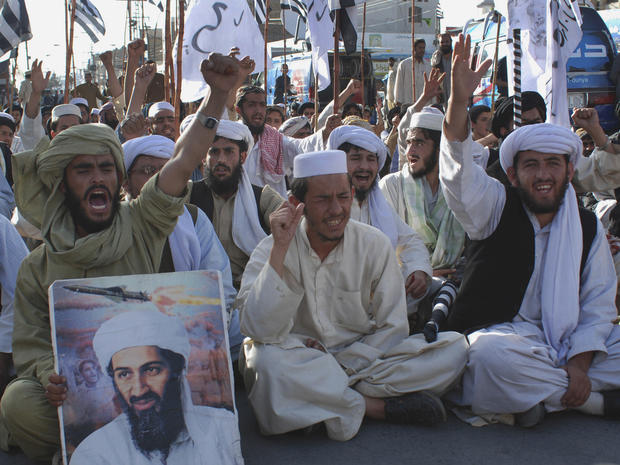Was the killing of Osama bin Laden legal?
There are essentially two schools of thought on the legality of the killing of Osama bin Laden in Pakistan: It was legal because the U.S. is at war, and therefore the Navy SEALs who got bin Laden simply killed someone trying to kill Americans, both at that moment and generally all the time; It was illegal because bin Laden was given no due process, and Pakistan did not authorize U.S. troops to operate in their territory.
Complicating this already complex issue is news from the White House that bin Laden was unarmed when he died. White House spokesman Jay Carney on Tuesday said that bin Laden resisted capture, and that one need not be armed to pose a threat in resisting capture.
Thus far, the same human rights and legal groups that have long criticized America's prosecution of the war on al Qaeda and Islamic extremists have remained mum. Tom Malinowski, the Washington director of Human Rights Watch, told Politico: "There are certainly circumstances under which lethal force is justified even in a law enforcement situation far from the battlefield, but we'll have to know more about what actually happened before making a judgment."
Indeed many observers are withholding judgment until the complete set of circumstances in the killing are known, but a lot of the reservations about the situation seem to hinge on whether the U.S. meant to kill bin Laden, or had actually intended to take him alive.
Bin Laden gone, but al Qaeda threat remainsVideo: Pakistan has "explaining to do"
Special section: The Killing of Osama bin Laden
Michael Mansfield, a prominent British defense lawyer, told the Guardian newspaper: "Assuming the mission was ... intended to detain and not to assassinate, it is therefore imperative that a properly documented and verifiable narrative of exactly what happened is made public. Whatever feelings of elation and relief may dominate the airwaves, they must not be allowed to submerge core questions about the legality of the exercise, nor to permit vengeance or summary execution to become substitutes for justice."
U.S. officials have said on several occasions that they would have taken bin Laden alive, however "remote" the possibility. Even so, taking bin Laden alive would have presented a whole different set of thorny legal issues, but the U.S. had plans in place for that circumstance, CIA Director Leon Panetta told CBS News' Katie Couric.
"I think we always assumed from the beginning that the likelihood was that he was gonna be killed," Panetta said."But if per chance he were to be captured, I think the approach was to take him quickly to to Bagram, transfer him to a ship offshore, and then have the principles at the White House decide what next steps would be taken."
Regardless of America's intentions, former President George W. Bush set the legal framework - in the U.S. judicial code - for bin Laden's killing just one week after 9/11, reports The New Republic. Public Law 107-40 gave congressional authorization to the president "to use all necessary and appropriate force against those nations, organizations, or persons he determines planned, authorized, committed, or aided the terrorist attacks that occurred on September 11, 2001." Bin Laden was, without question, one of those persons.
While bin Laden's killing is seemingly perfectly legal under American law, it was still carried out without permission in a foreign territory, perhaps the stickiest legal issue for the Obama administration. The killing of bin Laden was not the first time one country has executed an enemy in foreign territory without permission, and the legality of such actions are murky at best.
In a statement, the government of Pakistan said: "This event of unauthorized unilateral action cannot be taken as a rule. The Government of Pakistan further affirms that such an event shall not serve as a future precedent for any state, including the U.S.," adding such actions can sometimes constitute a "threat to international peace and security."
Additionally, there will be some legal scholars out there who believe the action is almost impossible to justify on a moral level. Professer Nick Grief, an international lawyer at Kent University, told the Guardian that the attack had the appearance of an "extrajudicial killing without due process of the law".
"It may not have been possible to take him alive ... but no one should be outside the protection of the law," Grief said, adding that even after World War II, Nazi war criminals had been given a "fair trial."
